There is a new pandemic that’s arrived on the Main Line, and just like COVID-19, it is highly contagious and can affect one’s physical and mental health. The disease is specifically known to prey on teenagers, becoming a growing issue in the LM student body. However, it can not be stopped with a mask or social distancing. This disease is brought to us by the glowing squares in our hands. It is the plague of social media and mindless scrolling, and its severe effects have left LM students stressed and depressed.
Mindless scrolling is the widely known term for the problem that is sweeping the globe. It refers to scrolling through a feed, particularly social media, that continues to reload new content and keep its users hooked for hours. TikTok, for example, is a huge cause of this. It loads an infinite amount of content onto a user’s “For You” page and will continue to play clips with a swipe of a finger. According to Forbes magazine, mindless scrolling can be compared to a slot machine in Las Vegas, where “you put minimal effort into an action but see an immediate reward. That’s what keeps us hooked.”
It’s disturbing to think of our phones as an addiction and our social media like hits of dopamine. It may even sound crazy. But teenagers are especially vulnerable to the allure of the scroll. Business Insider credits this phenomenon to children and teens being less “culpable for their time, so they may be much more susceptible to scrolling their whole day away. Studies are already showing that addiction-like behaviors are closely linked to worse performance at school.” The effects of mindless scrolling are also much stronger on growing adolescent brains than adults and can range anywhere from a decreased attention span to depression and other mental health disorders. Clearly, the damaging habits we have developed thanks to the constant feed of social media are hurting our generation. But how has it affected LM?

The biggest problem students face with the addiction of scrolling is how much it can distract them from work. Many have found that when doing homework late at night, the temptation to relax and watch a few TikToks can lead to hours lost to their phone. “When I scroll, I’m usually procrastinating on other work,” says Aerynne Cannan ’26. “Then I do badly on the test and scroll to distract myself from that stress.” This cycle continues to occur for many. It is also extremely easy to open social media during a study hall or boring class and lose valuable time or information. Jessie Liao ’26 admitted that “I have very little self-control when it comes to my phone and social media. I really need to work to set boundaries for myself so it doesn’t become an issue.” It is clear that boundaries are necessary, as mindless scrolling leads to unhealthy procrastination and heavy stress on the student body.
The main action that the LM administration has taken to try and prevent these mental health effects and the endless loop of scrolling is the “Off and Away” policy, which aims to prevent students from using phones in class. In a fall newsletter explaining the policy, Superintendent Dr. Yanni explained that the policy was created out of “an abiding concern for protecting and ensuring your physical health and mental wellbeing, as well as promoting a positive learning environment in our schools.” This ideally sounds like the perfect way to combat the issues students have with their phones. However, it is obvious that the plan has fallen through the cracks this year. Isabella Gilligan ’26, who recently wrote an Op-Ed piece on the ineffectiveness of the policy, states that “‘Off and Away’ has changed absolutely nothing. The teachers who allow phones in class still allow them, and those who don’t still don’t. There haven’t been any noticeable changes in school culture or student health as a result of the policy.”
The contagious disease of mindless scrolling has run rampant through LM, with no signs of stopping. However, there are some ways students have prevented themselves from falling into the trap of the “For You” page. Some place their phone in another room or turn it off while doing homework. Others turn off their cellular data when arriving at school, which saves battery life as well as prevents continuous content from uploading on platforms. Installing screen time limits on social media is a helpful feature that makes students conscious of their usage and helps lower their time spent on the apps. The most important thing to remember is that while scrolling through social media for hours might feel good temporarily, in the long term, it will only lead to stress and lost time. Help yourself and the LM community by stopping the mindless scroll!





Jill Altshuler • Mar 18, 2024 at 8:47 AM
Many parents and guardians wonder if the “Off and Away” policy has been effective…or even implemented with fidelity. I have heard administrators at the district level say that “anecdotally” the policy has been successful – so it makes you wonder where they are getting their information from. Thank you for informing all of us who read this wonderful resource!